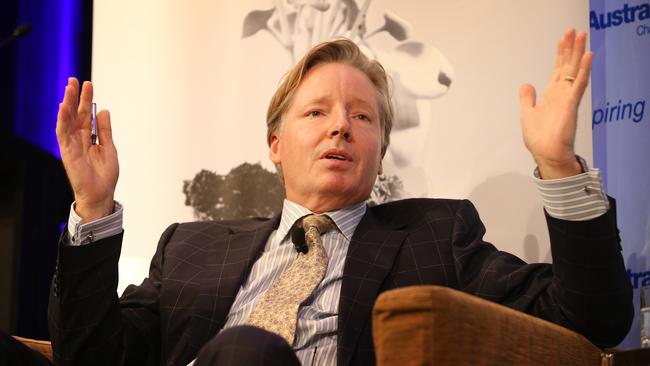Superannuation reforms needed for the over-60s

Thanks to aggressive rationalisation in the super sector the accumulation phase for Australian savers is at last looking fitter for purpose.
But what happens after 60? The retirement income phase is all over the place.
This is not good. Baby boomers, the first cohort to benefit from Australia’s compulsory super system, have hit the golden years.
At 60 the accumulated savings of Australians can move across to retirement income accounts with a tax-free status. So why do some funds not advise their members to make the shift to a pension income account until years later, if at all?
There are difficult calls to be made on how retirement funds should be invested to see a person out (the longevity risk) and what sort of investments should be considered.
And the super industry is nervous about jumping in with advice after the blast from the Hayne royal commission and recent case law. Meanwhile, time is ticking on.
On Tuesday Jeremy Cooper finished his gardening leave, having stepped down from Challenger as chairman of Retirement Income in August. The savings guru was part of Treasury’s super system review in 2009 and has been involved right through to the welcome reform of Your Super, Your Future.
Cooper says a step in the right direction is the Retirement Income Covenant that came into effect on July 1, requiring all super funds to have a strategy that maximises expected retirement income. That must be done while managing longevity risk, investment risk and inflation risk, and giving flexibility to access savings.
So far, the Covenant implementation is pretty soft. All funds have given their strategies to APRA and posted them on their websites. Some have issued new products, but others not yet.
“APRA has its work cut out to work its way through that,” says Cooper. “It normally identifies a cluster of best practices, looks at the strategies it thinks are the way forward and then guides the industry to move to that place.”
The accumulation phase is simpler and so far more lucrative than the retirement phase, particularly for super funds with scale. The US giant Vanguard’s decision in September to enter the Australian market is an endorsement of this.
Accumulation is the wholesale phase. “The average person does not really do anything. Their employer makes contributions for them, so all the activity is going on between the employer and the fund,” says Cooper.
“In retirement, the member suddenly pops up and is far more likely to be calling the call centre and asking questions. So traditionally fees charged in retirement have been higher than in the accumulation phase.”

At 60, a member can take savings as a lump sum but sensibly, most Australians do not do this unless it is to pay off a mortgage and then access the pension.
However, confusion around the retirement income phase has been costing Australians money.
Cooper says people over 65 have been sitting in the accumulation phase paying tax. “No one has woken them up to the fact that they can be in the tax-free pension zone, so that’s a problem. Inertia in almost all respects benefits the funds. If members don’t make choices, they don’t ring up the call centres, they leave their money sitting there, that’s all good for the fund,” he says.
Members who shift to an income retirement account are required to draw down a minimum amount each year, starting at 2 per cent and rising as they get older. The reason is that the government wants to avoid a ballooning tax-free savings bucket. Starting contributions were lowered during Covid-19 but could return to 4 per cent after 2023.
Unfortunately the minimum drawdown has been taken by many as the recommended withdrawal, even though the Retirement Income Review confirmed it was not a guide for what the person should be spending.
Overall there is a behavioural reluctance to dig into capital saved over 40 years.
“The idea that you would spend that nest egg which is part of the imagery of retirement is an anathema, particularly as you go up the wealth scale and into the self-managed super fund brigade. They are almost maniacally committed to not spending the capital,” says Cooper.
He says the risk is that Australians underspend in retirement and the sector has yet to come to grips with the issue.
“To tell funds you should be celebrating driving your funds down in retirement to give your retired members a better outcome, that’s a pretty tough sell,” he says.
Ageing baby boomers mean the retirement income pools of the biggest super fund are now big enough to be top-ranking funds of their own. But what about advice? Should a retirement income holder keep savings in a balanced fund or move into robotic ETFs?
Cooper says at the moment funds are very nervous and unsure about how to give advice. “The Hayne royal commission recommended cracking down on funds reaching out to members and saying have a look at this project.”
Another serious mismatch is that while accumulation of super is all about the member, in seven out of 10 cases the retirement savings advice is a two-person financial proposition.
“Funds are in a state of confusion about just how far they can go in ascertaining what the household looks like, which is way outside of the wheelhouse of what they are doing. They are only talking to a member individually about that member.”
The entire sector is waiting on Michelle Levy’s quality of advice review for clarity and the government’s response. Due in March, the review was recommended by Hayne in 2019.
“If there are positive changes coming out of the Levy review which makes it a lot easier for funds to talk to their members about this stuff, you will see a dramatic change from where we are now,” says Cooper.





